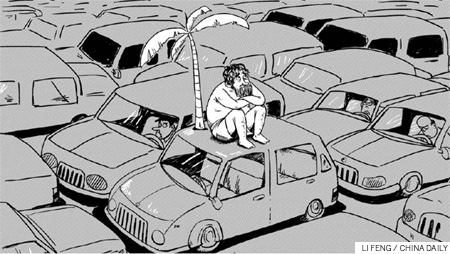Op-Ed Contributors
Debate: Auto industry
(China Daily)
Updated: 2010-10-11 08:00
 |
Large Medium Small |
Ge Baoshan
Overheated industry needs cooling
China's booming auto industry and carmakers' ambitious plans to increase their production capacity are fraught with potential risks, especially of overcapacity.
Over the few past years, almost all carmakers in China have been following one model: increase production as much as possible to get a greater share of the world's most populous market. But this model now raises a question: Is the relationship between the fast development of the auto industry and social environment sustainable and harmonious?
Automobiles are durable consumer goods, and car companies cannot just go on building new factories blindly and then expect consumers to buy all the extra cars they make.
Roads in major cities, especially in Beijing, Shanghai, Guangzhou and Shenzhen, are congested. Public transport is inefficient. And driving a car has become more expensive and less convenient.
That explains why increasing the auto industry's production is like putting the cart before horse. In fact, we'd better first deal with several challenges created by the overcapacity problem, such as shortage of energy, air pollution and traffic jams, before we rush to make more cars to meet buyers' frenzy across the country.
Saving energy and reducing emissions are very important for the country's sustainable economic and social development. But the reality is that the pace of increase of carmakers' production capacity has far exceeded the speed of urban traffic systems' development. For example, many cities have just begun or are only planning to build subway networks, which is the most efficient and important way to ease the pressure of surface on roads.
Another - and intricately linked - problem is causing alarm: while roads are chock-a-block with cars, underground garages and car parks lie unused because some of them are startlingly expensive - they can cost tens or even hundreds of thousands of yuan.
Many people choose to drive to work because of the private and more comfortable space cars provide. To solve this problem, the government should build more subways and introduce more buses so that people can commute more easily and comfortably to and from work, and thus won't feel the need to own a car.
If the government doesn't give importance to expanding the public transport fleet and channels on a priority basis, more people will tend to buy cars and the situation on the roads will worsen.
Take the example of metropolises like New York and Tokyo. They have made the development of the public transport system an integral part of their urban expansion and development programs. Their efficient subway and bus systems dissuade people from buying cars.
Besides, China's demography is different from that of developed countries. In many developed countries, people prefer living in the suburbs or outside cities, where it is easier from them to park their cars. But in China, even many affluent people prefer living in cities, where they spend huge amounts to buy space to park their cars.
China has a lot to improve when it comes to implementing traffic rules. The government has to help raise people's awareness of traffic rules.
On the consumer front, cars have become the newest luxury on which some people are more than willing to spend. Many of those who can afford cars prefer to buy bigger ones, irrespective of whether they need it or not. Such people seem to be blind to traffic jams, carbon emissions and other environmental problems. This shows people's choice of buying a car is not yet rational.
It is thus important that the carmakers cope with the overcapacity problem and stop increasing their output blindly. Though the auto industry is an important pillar of the national economy, its market does not offer conditions favorable for continuous expansion. Other countries' markets will not help either, because they are either saturated or full of higher-quality cars.
Auto companies say that by making more cars, they are responding to the increasing market demand in China. But the fact is, there are signs, and real ones, that the auto market is already overheated, and it would take the efforts of all parties to cool it down.
The author is a professor and an auto industry expert with the School of Management, Jilin University. This is an excerpt of his interview with China Daily's He Bolin.

(China Daily 10/11/2010 page9)